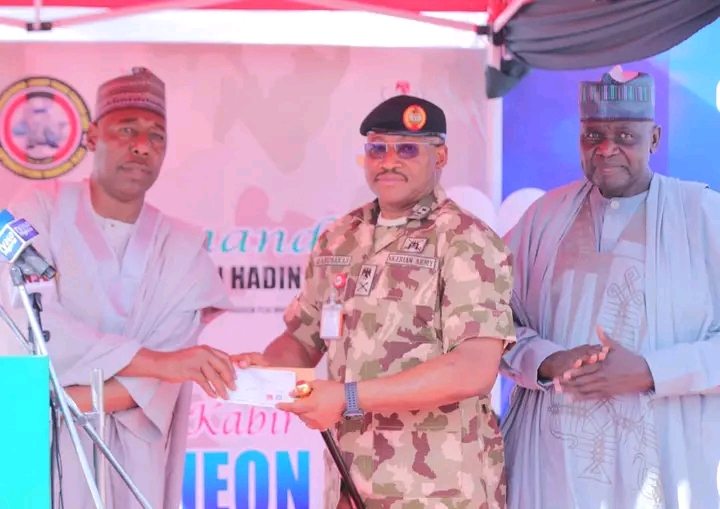By Abdul Lauya
Borno State Governor, Babagana Umara Zulum, has donated N100 million to families of soldiers killed in action and to those wounded in Nigeria’s prolonged fight against insurgency in the northeast.
The announcement came during an Eid El-Kabir Sallah luncheon hosted at Maimalari Barracks in Maiduguri, co-organised by the Chief of Army Staff, Lieutenant General Olufemi Oluyede, and the Chief of Air Staff, Air Marshal Hassan Abubakar.
Governor Zulum presented the cheque to the Theatre Commander of Operation Hadin Kai, Major General Abdussalam Abubakar, pledging N500,000 to each wounded soldier, while the remaining amount would be disbursed to families of the deceased.
Present at the ceremony were senior military leaders, including the Force Commander of the Multi-National Joint Task Force, Major General Godwin Mutkut, alongside federal and state government dignitaries such as SSG Alhaji Bukar Tihani and APC State Chairman Hon. Bello Ayuba.
Governor Zulum, known for his frontline support for troops, praised the bravery of soldiers and assured continued support to the Nigerian Armed Forces, emphasizing that their sacrifices would not be forgotten.
But beyond the solemnity and symbolism of the governor’s donation lies a more complex and uncomfortable truth — the fight against insurgency, now in its second decade, has created a parallel economy of war-related spending and institutional enrichment.
Analysts have long pointed to how the conflict, despite its devastating toll on civilian lives and soldiers alike, has sustained a lucrative network of contracts, emergency allocations, and unchecked defense expenditures.
With little transparency on defense budgets and few visible long-term outcomes, critics argue that the incentives for a decisive end to the insurgency may be quietly undermined by those benefiting from its continuity.
Events like the luncheon and symbolic gestures of support, while important for morale, risk becoming cyclical rituals in a conflict that increasingly appears structured to persist rather than conclude.
The Borno governor’s generosity, however heartfelt, occurs against the backdrop of a protracted conflict that has persisted for over 15 years, with significant human and financial costs. According to the United Nations, the insurgency has resulted in approximately 35,000 deaths and displaced over 2 million people in northeastern Nigeria .
In 2023, the Nigerian government allocated N2.98 trillion, or 13.4% of the federal budget, to the defense and security sectors . This funding encompasses personnel costs, overheads, and capital expenditures for the military, police, intelligence, and paramilitary forces.
It also highlights the gap between leadership empathy and the structural inertia of a war that has become central to political and military economies alike.
As soldiers and their families continue to pay the price, questions remain about who truly benefits from an insurgency that shows no sign of resolution, and what it would take to break the cycle.
For advert placement and inquiries, publication of press releases, and news coverages, please call: Phone: 08052898434 Email: editor@eyereporters.com, click here to view the advert rates.



